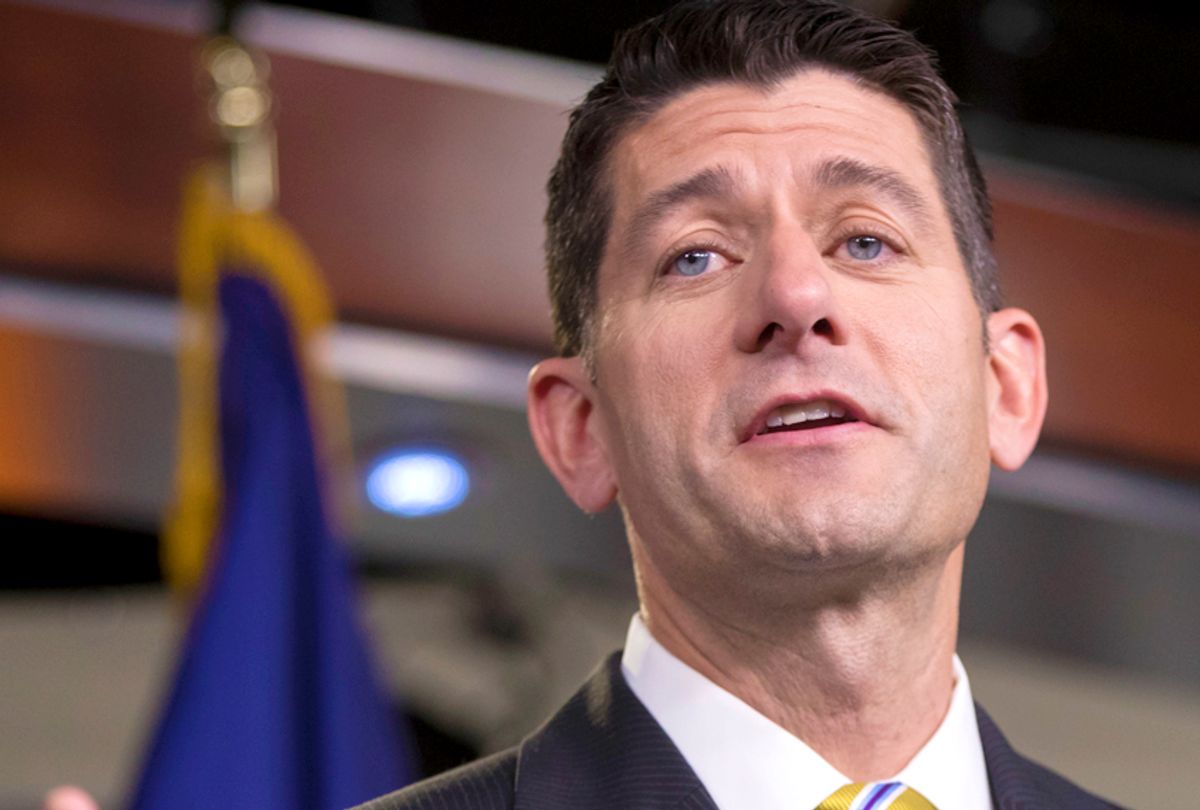Amid the impending GOP tax reform bill there has been plenty of talk about the estimated $1.5 trillion slash in taxes, but there has been almost no discussion of how the Republicans — who regularly tout the importance of the federal deficit — plan to pay for their proposed cuts.
On Tuesday, House Speaker Paul Ryan, R-Wis., insisted that the national debt is a serious issue, and that in order for it to be fixed, entitlement programs would have to be gutted in order to pay for the tax cuts.
"You cannot get the national debt under control, you cannot get that deficit under control, if you don’t do both — grow the economy, cut spending," Ryan said during a town hall event in Virginia for Fox News.
Ryan claimed that the Republican tax plan "grows the economy" but that the party has "a lot of work to do in cutting spending."
Democrats have said the Republican tax plan is nothing more than a grab for social safety nets.
"This is a nasty, two-step strategy that has long been the holy grail for hard-right Republicans," Senate Minority Leader Chuck Schumer, D-N.Y., told The New York Times. "If this bill passes, you can bet the Republicans will immediately sharpen the knives for middle-class benefits."
The national debt surpassed $20 trillion in September, the highest mark in U.S. history. During this time, the nation has embedded itself in numerous conflicts abroad — a major driver of the massive debt — but has still dedicated more federal funds to the military than ever before.
The Congressional Budget Office "warned that the tax bill could set off an arcane budget rule" which would drastically cut funding for Medicare over the next decade and as much as $25 billion next year, according to Times:
The pay-as-you-go law requires that legislation that adds to the federal deficit be paid for with spending cuts or other offsets. If that does not happen, automatic cuts to programs like Medicare kick in. The Medicare cuts, which are capped at 4 percent of the program’s annual spending, could reach almost a half trillion dollars over 10 years, according to the nonpartisan Committee for a Responsible Federal Budget.
While bipartisan legislation could potentially be passed to avoid the Medicare cuts, it's not clear if the Republicans would work towards making that happen.
"I can’t believe how quickly the deficit hawks in the Republican Party flew away after they saw the $1.5 trillion," Oregon Senator Ron Wyden, the top Democrat on the Finance Committee, told the Times. "We’re sure that they will start making their way back when we see the deficits."
President Donald Trump has widely proclaimed, both on his campaign and since he's assumed office, that his tax agenda would provide relief for middle class families and that the plan would close loopholes and not benefit him or other wealthy elites.
As it turns out, Trump and his top economic adviser, a key architect of the plan, Gary Cohn, the former Chief Operating Officer at Goldman Sachs, have been demonstrably incorrect in their claims that the middle class will be the primary beneficiaries of the tax plan and that the wealthy won't be showered with tax relief. Some Republicans have even argued that it doesn't benefit the rich enough.
On Wednesday, during an event for the Wall Street Journal's CEO Council, the crowd was asked by the WSJ, "If the tax reform bill goes through, do you plan to increase investment — your company's investment, capital investment?"
After there was little participation by the crowd of CEO's, Cohn asked, "Why aren't the other hands up?"
VIDEO: CEOs asked if they plan to increase their company's capital investments if the GOP's tax bill passes.
A few hands go up.
"Why aren't the other hands up?" Gary Cohn asks.#WSJCEOCouncil pic.twitter.com/TD2oAlN27S— Natalie Andrews (@nataliewsj) November 14, 2017
Everything is going as planned for the GOP!



Shares